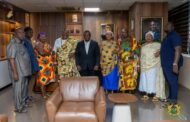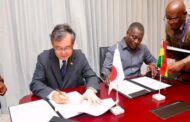A prominent Ghanaian lawyer, Isaac Minta Larbi Esq, has called for a radical shift in the management of Ghana’s natural resources, particularly the recently discovered lithium mineral.
In a passionate and strongly worded statement, Lawyer Isaac Minta Larbi urged the Ghanaian government to reconsider the way it handles resource agreements, emphasizing the need for industrialization and greater ownership to benefit the nation and its citizens.
Ghana’s rich endowment of natural resources has often been a source of both promise and controversy, with concerns about how these resources are managed and who benefits from their exploitation.
Lawyer Isaac Minta Larbi’s statement throws more light on these issues and calls for a more progressive approach.
The Koforidua based legal practitioner said ” the youth of the country cannot always be deprived of the needed employment opportunities.Enough of the business as usual approach towards our national resources which has never helped this country apart from consistently making us poor.
If Dr Kwame Nkrumah was still our President we won’t be here but I bet you in the absence of Dr Kwame Nkrumah there are still Ghanaians out there when given the chance will do things better and not do what we have been doing”.
In his message, Larbi expressed frustration with the prevalence of royalty-based agreements in the country, which he contends have not delivered substantial benefits to the nation.
He cites examples of other nations, like Bolivia, which insist on local industrialization of resources before granting extraction agreements. Larbi argues that such an approach can lead to significant job creation and increased revenue for the government.
The lawyer also pointed to Ghana’s experience with gold and oil resources, where royalty-based agreements have not necessarily translated into national development as expected. He criticized the Ghanaian government for pursuing agreements that, in his view, prioritize immediate gains over long-term prosperity.
Larbi highlighted the importance of sovereign control over resources, advocating for a model where Ghana pays contractors to extract resources, thus allowing the nation to own 100% of the resources once extracted. He also proposed raising funds through a mutual fund or a special levy to finance such endeavors.
“Recently Bolivia insisted that unless and until lithium factories are set up in their country, and unless and until the extracted lithium is processed into finished goods such as batteries, etc it will never sign any agreement to extract lithium out of the country.The question is what about us?Do you know the benefits to Bolivia of such a good decision regarding their lithium?”.
“Not only do they get jobs for the extraction of the lithium when the companies are set up in their country, but the citizens also get more jobs when
the processing companies are also set up for the processing of the lithium into finished goods.The various factories along the chain of production would lead to thousands and thousands of jobs for the citizens.Not only that, each factory along the chain of production would be paying taxes to the state from the government level to the local level in addition to income tax from all these employees”
Furthermore he said “If you are to put just a few numbers together to determine the number of different companies that would be set up along the chain of production from extraction to the various processing factories all the way to the finished goods it will not be less than over 500 different companies so you can imagine the numerous jobs and taxes that would be generated to the State.Also, when the finished goods are exported the country gets export taxes and so many other benefits too.So the question is, in the abundance of all these tremendous benefits why would the NPP government enter into a royalty based agreement with an Australian company just for them to extract our lithium and pay only peanuts to Ghanaians whilst we continue to suffer?What will 13% do to us?.Very soon we’ll be here praising Bolivia for what it did with its lithium and we’ll be wishing we did same but it’ll be too late.
Do we always have to sell our resources cheap and then later go back to the IMF to go and beg?”
The lawyer’s impassioned statement reflects the concerns of many Ghanaians, especially the youth, who are eager for a change in resource management policies. He emphasized that the youth of the country are eager to see a more radical approach to development and a proactive handling of national resources.
While the complexities of resource management often involve economic, environmental, and social factors, Larbi’s call to action highlights the importance of informed civic engagement and the need for policies that prioritize the long-term welfare of the nation.
The lawyer’s message underscores the significance of the ongoing debate surrounding Ghana’s resource management, emphasizing the need for transparent and responsible approaches that prioritize the nation’s well-being over immediate gains.
The call for a reevaluation of resource agreements is a topic likely to remain in the spotlight as Ghana navigates its path towards economic development and sustainable resource management.
Source: Mybrytfmonline.com/Obed Ansah



















































